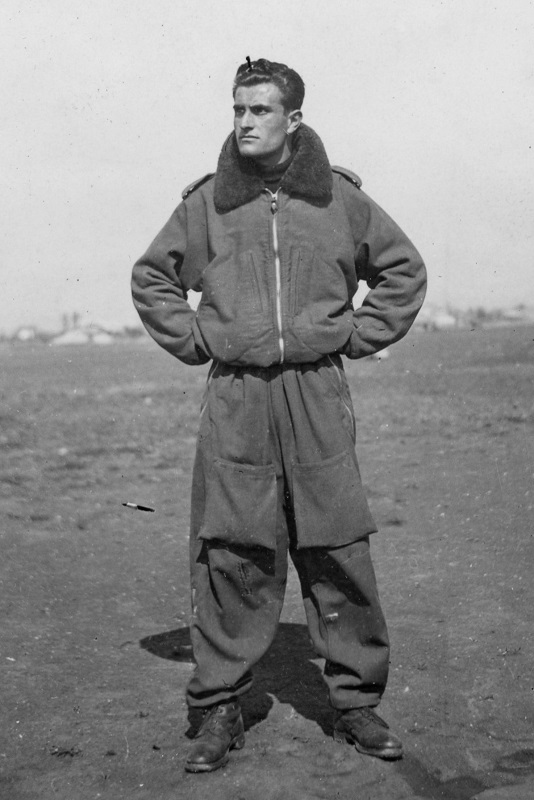Italy

Sergente Maggiore Antonino Malavasi
Italy

Sergente Maggiore Antonino Malavasi

Image kindly provided by Pierpaolo Maglio
| Date | Decoration | Note |
| ??/??/42 | Medaglia d’argento al valor militare | 1940-43 |
| ??/??/48 | Medaglia di bronzo al valor militare | 1940-43 |
Antonino Malavasi was from Castelfranco Emilia (Modena).
In November 1941, Sergente Malavasi served in the 394a Squadriglia, 160o Gruppo CT, which was equipped with Fiat CR.42s and based in Libya.
On 4 November 1941, nine Marylands of 12 SAAF attacked Berka airfield from an altitude of 19,000 feet, claiming to have obtained good results. They reported having been attacked by two CR.42s and having shot one of them down. This was claimed to have been the work of Lieutenant Parson’s crew, who saw the second one lose height without control. They returned to base at 15:40; none of the bombers was damaged.
Lieutenant T. W. Ryan flying in No. 3 sub flight stated that his aircraft lagged behind while they were attempting to complete their photographic run over the target. When this operation was completed, he tried to catch up with his formation:
“On doing so, I sighted 2 enemy fighters ahead on our starboard quarter, apparently trying to attack No. 2 sub-flight. On alternative course by turning towards the fighters, we caught one fighter unaware who at this time was flying level abeam at approximately 150 yards.”The top rear gunner opened fire on this position raking the enemy aircraft with about 70 to 80 rounds of tracer and armour piercing bullets. All appeared to enter the aircraft. The enemy was then seen in a spiral dive with white smoke pouring from him. The top gunner gave him a final burst, emptying his ammunition pan.
“The enemy fighter which was attempting to attack us from the quarter was approx. 250- 300 yards away when my top rear gunner opened fire on him. About 70 or 80 rounds of tracer and armour piercing bullets appeared to enter the target. Smoke issued from the enemy aircraft, which appeared to wobble and then went into a vertical nose dive. When passing underneath the Maryland, still in nose dive, the enemy received a short burst from the bottom rear gunner and he was last seen in a nose dive making straight for the ground.”It seems that the bombers had come up against two CR.42 units. At 13:05 two CR.42s of the 160o Gruppo were on a defence patrol above Benghazi, piloted by Sergente Maggiore Duilio Bernardi (393a Squadriglia) and Sergente Antonino Malavasi (394a Squadriglia). Warned via radio, they spotted nine enemy bombers identified as Blenheims, in a stacked patrol formation. Thanks to his plane’s height advantage, an altitude of 6,000 m compared with the 5,800 m of the bombers, Bernardi was able to keep within firing range long enough; in fact, he claimed to have shot down two bombers. One exploded in mid-air while the other crashed into the ground south of Benina. Malavasi, instead, only managed to machine gun a third bomber without any visible results; in return, his aircraft was damaged.
In the beginning of March 1942, Regia Aeronautica spotted Chad-based Free French forces led by Général Jacques-Philippe Leclerc intruding into the Fezzan desert area, in the southern part of Libya, to harass Italian garrisons in order to distract forces from the northern front. The Leclerc column was formed by four independent patrols, the aerial support being provided by the Groupe Bretagne, composed of Nates and Rennes Escadrilles. The former was led by Lieutenant Jean Mahé and had four Martin Marylands (ex-French Martin 167s, known simply as ‘Glenns’) and a Potez 540. The latter, commanded by Lieutenant Marcel Finance, had five Lysanders and three Potez 29s.
Leclerc had moved from Chad on 17 February and ten days later surprised and overwhelmed the small garrison of Uigh el Kebir. Here he established his command post and on 28 February his forces managed to capture the Gatrun and Tegerri garrisons, but a patrol led by Capitaine Jacques Massu met strong resistance at Umm el Araneb and was forced to retreat.
As a result of the French aerial activity in Fezzan, Maggiore Michele Mandara, CO 160o Gruppo CT, deployed four CR.42s to Sebha, led by Tenente Eduardo Sorvillo (394a Squadriglia). The other three pilots were Sergente Maggiore Duilio Bernardi (393a Squadriglia), Sottotenente Piero Bertonasso (375a Squadriglia) and Sergente Maggiore Malavasi (394a Squadriglia). A single S.79 of 175a Squadriglia RST was also sent as reinforcement, flown by Tenente Giuseppe Pellizzotti.
The CR.42s undertook their first sortie from Sebha on 6 March, hunting French vehicles between there and Zuila, but without result.
On 7 March, the four CR.42s at Sebha moved to Umm el Araneb. After a reconnaissance to Gatrun, while on the ground at Umm el Araneb, they were bombed and strafed by the French Lysander P9197 of the Rennes Escadrilla, flown by Lieutenant Marcel Finance. The fighter of Tenente Eduardo Sorvillo (MM7627/394-8) was set on fire, the pilot suffering severe injuries, while Sottotenente Piero Bertonasso’s CR.42 was slightly damaged.
The pair of Fiats still serviceable took off immediately, flown by Sergente Maggiore Duilio Bernardi and Sergente Maggiore Malavasi to hunt for the hostile aircraft. Sergente Maggiore Malavasi found the Lysander and fired at it repeatedly, forcing it to land in the desert trailing smoke. Lieutenant Finance took the gunner Sergent Chef Fernand Leroy, who had been wounded in the leg, out of the Lysander and sought the cover of the smoke. It proved only to be a smoke bomb hit by a bullet from Malavasi’s guns.
Meanwhile, Malavasi flew for some time over the grounded aircraft without attacking it further. Convinced that he had inflicted irreparable damage, he then departed. This allowed Finance, having got the gunner back on board, to take off and fly back to Uigh el Kebir.
Malavasi reported the mission as between 14:00 and 14:40.
At Umm el Araneb meantime, the wounded Sorvillo was put in an S.79 called to the spot and flown to Castel Benito.
The S.79 (MM21465) flown by Tenente Pellizzotti subsequently crashed at Sebha for unknown reasons, all crew being killed.
On 8 March, two more 160o Gruppo CR.42s were flown down to Sebha by Tenente Raoul Francinetti and Sergente Maggiore Aurelio Munich to replace the two which had been destroyed. Meanwhile, however, all the French aircraft left the area, retiring to their base at Faya in Chad, leaving Leclerc’s patrol without air cover.
The next day, on 9 March, Tenente Francinetti and Sergente Maggiore Munich strafed Capitaine Massu’s patrol, leaving one vehicle in flames and others damaged. Francinetti’s CR.42 was slightly damaged by small-arms fire.
In the afternoon Tenente Francinetti, Sergente Maggiore Malavasi and Sergente Maggiore Munich again attacked Massu’s troops, this time near Uigh el Kebir, ten small trucks were claimed destroyed and others damaged.
On 30 March an Italian patrol of 3o Compagnia Sahariana found the wreck of eight French vehicles. At this point the first Fezzan Campaign was at an end, French forces returning to Chad and the Italians garrisons being re-established.
Malavasi ended the war with one biplane victory.
Claims:
| Kill no. | Date | Time | Number | Type | Result | Plane type | Serial no. | Locality | Unit |
| 1941 | |||||||||
| 04/11/41 | 13:05- | 1 | Blenheim (a) | Damaged | Fiat CR.42 | S Benina | 394a Squadriglia | ||
| 1942 | |||||||||
| 1 | 07/03/42 | 14:00-14:40 | 1 | Lysander (b) | Destroyed | Fiat CR.42 | Gatrun | 394a Squadriglia |
Biplane victories: 1 destroyed, 1 damaged.
TOTAL: 1 destroyed, 1 damaged.
(a) Probably claimed in combat with Marylands from 12 SAAF Squadron, which didn’t suffer any losses. However Italian records claim one bomber force-landing inside Axis territory.
(c) Lysander P9197 of Rennes Escadrilla slightly damaged, force-landed but was later flown out.
Sources:
A History of the Mediterranean Air War 1940-1945: Volume One – Christopher Shores and Giovanni Massimello with Russell Guest, 2012 Grub Street, London, ISBN 978-1908117076
A History of the Mediterranean Air War 1940-1945: Volume Two – Christopher Shores and Giovanni Massimello with Russell Guest, Frank Olynyk & Winfried Bock, 2012 Grub Street, London, ISBN-13: 9781909166127
Elenco Nominativo dei Militari dell’ A. M. Decorati al V. M. Durante it Periodo 1929 - 1945 2 Volume M - Z
La Battaglie Aeree In Africa Settentrionale: Novembre-Dicembre 1941 – Michele Palermo, IBN, ISBN 88-7565-102-7
Additional information kindly provided by Pierpaolo Maglio


